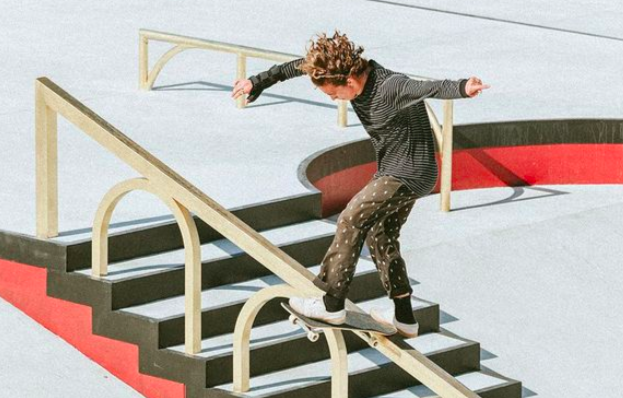South African athlete and skater, Brandon Valjalo is set to represent South Africa for the first time at the Tokyo Olympics.
As Speedsta once recorded, “if [Valjalo] isn’t in California or Europe for the World Cup skateboarding contest circuit, you can find Valjalo skateboarding throughout South Africa especially at his local skatepark YBF, or at his private skatepark in his backyard.”
And now his name is in headlines as not only he, but the sport makes its Olympic debut in Tokyo. What else is interesting about Valjalo, beyond his incredible talents, is how he notes the stereotypes on skateboarding as being an ‘outcast’ venture. We take a look at his journey, thoughts, as well as how the outcasts are now gaining recognition for what has always been cool.
For those who don’t know who the wavy-haired skateboarding guru is, here’s a little insight.

The early days, a three-year-old and a skateboard.
Valjalo got into skateboarding at three-years-old, because there was always a skateboard around in the garage as per Slikour Onlife. “Then I guess I just took it a little bit more seriously,” Valjalo humorously recalls.
For Johannesburg locals, Valjalo’s main skateparks back in his early days included some classics like the Bright Water Commons skatepark. He proudly wears his once-a-Brights-local heritage.

Champion status.
In 2013, at the young age of fourteen, Valjalo started competing professionally as the Valjalo blog writes. The kid-wonder really cruised onto the skateboarding scene’s elite radar in 2014 as Jazz Kuschke writes for Red Bull.
Valjalo earned his first South African Championship and the World Youth Championship at the Kimberley Diamond Cup in 2014. He then retained his status by maintaining his South African Championships title at the KDC in 2015.
In 2017, he took on the best of African skateboarders at the Ultimate X where he won the title of African Champion.
Since then he has competed all over the US and Europe.

To Tokyo and beyond.
He’s now swiftly skating his way to the Olympics, but he recalls once thinking that it was “something he never thought would happen when he started competing.”
In leading up to the most prestigious showcasing of sport’s best, Valjalo spent some time skateboarding in Sun City.
On representing Mzanzi, Valjalo says that he “can’t wait to go and fly the South African flag. It’s a privilege and an honour.”
On being a pro skateboarder, Valjalo says that “It’s a very exciting time for skateboarding as a sport in general and also for the Olympics.”

Beyond tricks and bails, there’s a lot of physical maintenance.
Valjalo explains that he usually skateboards between five and eight hours a day, and has an extensive cardio workout that involves between five and ten kilometre runs and core and strength sessions at the gym. He also does a lot of mobility work “in the form of Yoga, pilates and stretching to help safeguard against injury.”

On skateboarding and the actual structure of the discipline.
Valjalo notes the misconceptions of skateboarding, in reference to it being stereotypically categorised for the “outcast kids” and hopes that now, skateboarders can be seen as professional athletes, especially in our country.
There are multidisciplinary facets to it, and it’s a discipline. Judging is “super structured and objective,” according to Valjalo in his conversation with Red Bull. There’s a “panel judging on style, execution, trick difficulty and the obstacle on which you are performing the trick.”
His speciality is street skateboarding, and in SA the street league format has been around for “probably more than a decade.”

On life lessons, he learnt alongside his skateboard.
Talking to Speedsta, Valjalo expressed that a life lesson he’s kept from many bails was to “try and fail, but never fail to try.”
The once seen to be outcasts are in, and it speaks to the times we’re living in
When we see sports, skills, hobbies and music that were once seen to be stereotypical for ‘kids going nowhere’ as our society has projected, being recognised on prestigious levels my thoughts are two-fold writes Cape {town} Etc’s Ashleigh Nefdt.
For one, it’s kind of an ‘at last‘ feeling where the world is finally able to acknowledge a sport like skateboarding on the highest platforms. On the other, it speaks to everyone who felt their passions made them different or outcasted. What it says to me, is that there really is a season for everything, and just because mainstream society isn’t loving what you are, you can bet your bottom dollar that there will be a time where it’s the in thing, and even if it’s not, if you love it you love it, that’s enough.
Social media and Tik Tok have exhibited niche culture more than ever. Niche culture as a whole speaks to the fact that there will always be a select few that share your passions, and as we see from Valjalo, a whole competitive world that took a while to get the recognition it deserved.
Picture:@streetskateboardingrome

